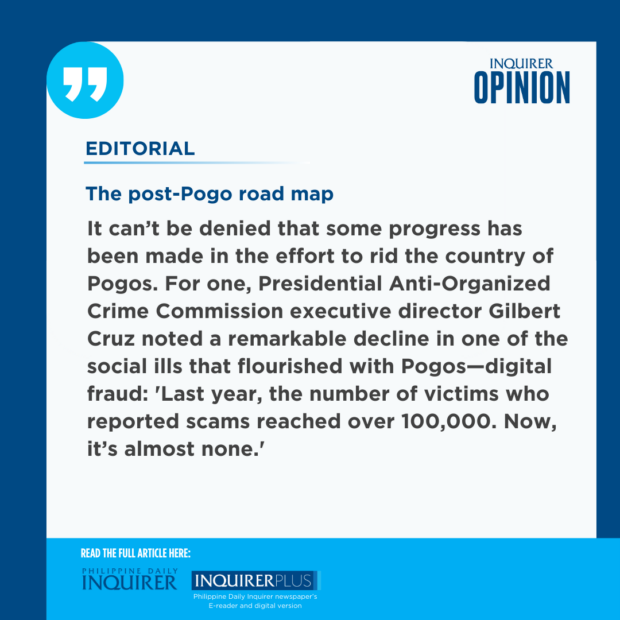The post-Pogo road map

If 2024 spelled doom for the once bustling industry known as Philippine offshore gaming operators (Pogos), 2025 looks poised to hammer the final nail in its coffin.
Or so the government hopes.
That is, of course, if our law enforcers were to do a proper job of cracking down on the weaselly characters who continue to run illicit operations nationwide despite the Pogo ban declared by President Marcos during his third State of the Nation Address last year.
Article continues after this advertisementWhich is why it’s comforting — though not entirely reassuring — to hear government officials discuss the road map for the post-Pogo Philippines that we were promised following the lapse of the Dec. 31 deadline for the cessation of offshore gaming activities.
On New Year’s Day last week, Solicitor General Menardo Guevarra spoke of his office’s tasks ahead, including the revocation of all birth certificates fraudulently obtained by foreigners and the seizure of assets they might have acquired illegally in the country.
“The first order of the day is to take possession of and control over [their properties],” the official said, while admitting that: “At this time we have no definite figures on the aggregate value of these assets.”
Article continues after this advertisementTrue scale of Pogo scourge
Guevarra’s declaration is certainly a welcome step in the effort to rid the country of this years-old plague. Unfortunately, the second part of his statement inspires little confidence that such a process would be systematic and thorough, as it appears that the government has not even begun to grasp the true scale of the Pogo scourge.
Congressional investigations have shown that thousands of foreign nationals, particularly Chinese, obtained false Philippine birth certificates to acquire official documents which enabled them to engage in activities restricted to Filipinos, such as purchasing land, starting businesses, or even running for public office — like dismissed Bamban, Tarlac Mayor Alice Guo, who is now widely suspected of being a Chinese citizen. Such transgressions spawned the web of criminal activities associated with Pogos, from scamming, money laundering, and human trafficking to kidnapping, extortion, and violence.
Online gaming operations had existed in the country since 2003, but it was only during former President Rodrigo Duterte’s administration that the government pursued them as revenue sources in earnest, prompting the Philippine Amusement and Gaming Corp. (Pagcor) to issue operational guidelines for Pogos in September 2016.
Billions in revenue for Pagcor
At its height, the industry employed 118,239 people and generated P8.02 billion for Pagcor. But this came at a tremendous cost.
Based on data from the Philippine National Police, the peak of Pogo activities in 2019 coincided with a rise in crimes associated with their operations. “As of May 2024, Pogo-related crimes have victimized 2,320 Filipinos (40 percent of the total victims) and 1,945 Chinese nationals (34 percent),” Sen. Sherwin Gatchalian said at a forum organized by the Stratbase ADR Institute in December.
From a high of 298 licensed Pogos in 2019, the number had dwindled to 17 by Dec. 10, all of which were expected to cease operations at the end of 2024, according to Pagcor chair Alejandro Tengco.
It can’t be denied that some progress has been made in the effort to rid the country of Pogos. For one, Presidential Anti-Organized Crime Commission executive director Gilbert Cruz noted a remarkable decline in one of the social ills that flourished with Pogos — digital fraud: “Last year, the number of victims who reported scams reached over 100,000. Now, it’s almost none.”
Foreigners unaccounted for
For its part, the Bureau of Immigration (BI) has commenced the tedious job of tracking down tens of thousands of foreign Pogo workers and deporting them. Last week, bureau spokesperson Dana Sandoval reported that of the 33,000 foreigners who worked for legitimate Pogos, some 22,000 had departed the country voluntarily. In December, another BI official disclosed that of the 11,000 awaiting deportation, “less than a thousand” remain unaccounted for.
Left unsaid was the fact that many Pogos were never legitimate in the first place.
Fly-by-night Pogos are now camouflaged as restaurants, resorts, or hotels in various parts of the country, according to Interior Secretary Jonvic Remulla. One can only imagine how this is possible without the protection of local power brokers, criminal syndicates, or worst, public officials.
















